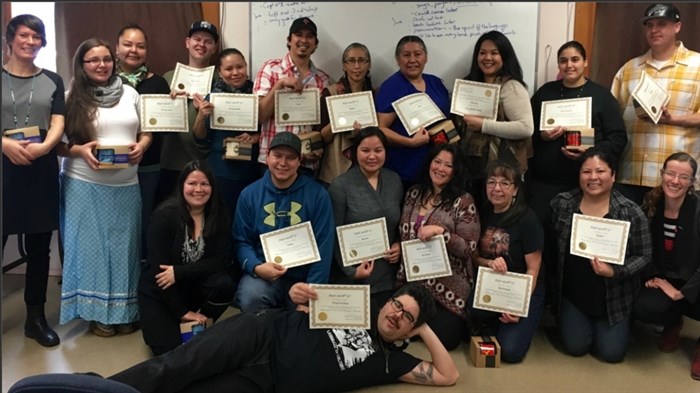
The first graduate class from the Syilx Language program, 2019.
Image Credit: Syilx Language House
July 23, 2019 - 6:00 PM
KELOWNA - For most people, learning a new language is a want-to-do. For many First Nations people long divorced from their native tongue, it’s a must-do.
That should be easily apparent for graduates from Syilx Language House who just completed a four-year, 1,600-hour program to make them full speakers.
Program organizer and lead activist Michele Johnson says more than a dozen recent graduates are vital to keeping the language alive.
“We feel it’s our role, our responsibility. Our communities need us to study this language,” Johnson says. “We have managed to get ourselves to become speakers and we hope that will have even more success with future generations.”
The Syilx Language House will host a celebration commemorating the graduates from the Syilx language program on August 19 at the Osoyoos Indian Band. They represent the first graduating class from the program.
The course work is comparable to obtaining a university degree, with homework, assignments and regular class time. The program follows the curriculum created by the Salish School of Spokane.
Johnson hopes that the next course, which begins in September, will be granted university credit.
"That's the challenge coming up ahead,” she says, “to find a university that's willing to embrace the international year of indigenous languages and embrace the enthusiasm that’s coming out of the Indigenous Language Legislation.”
Unfortunately, there are many obstacles to overcome, especially in light of the limited funding and resources from a grassroots level.
What makes this program particularly unique is the lack of tuition expenses.
“We didn’t want to put any barriers between the language and the people,” Johnson says. “That was the success of the program. We just created a situation where we were all paid to be there and we learned the language during our work hours.”
The funding acquired through contributions from three Okanagan Syilx bands and fundraising only covered the cost of several teachers. Students were funded through their workplaces to go through the program.
Johnson stresses the importance of advocacy for this program, in light of the epidemic rates of youth suicide in First Nations communities.
“We know that learning our language is directly related to the health of our communities in a profound, direct way," she says. "There’s research that shows that learning language is linked to lower rates of youth suicide.”
Johnson hopes that the success of the program will be noticed at a government level, so that more funding can be acquired to support those in the program and also grant the program a university designation.
The Grad Celebration will be open to the public and includes an opening ceremony, singing sing Nsyilxcn with a live band, dancing, prizes and dinner.
To contact a reporter for this story, email Brie Welton or call (250) 801-9235 or email the editor. You can also submit photos, videos or news tips to the newsroom and be entered to win a monthly prize draw.
We welcome your comments and opinions on our stories but play nice. We won't censor or delete comments unless they contain off-topic statements or links, unnecessary vulgarity, false facts, spam or obviously fake profiles. If you have any concerns about what you see in comments, email the editor in the link above.
News from © iNFOnews, 2019